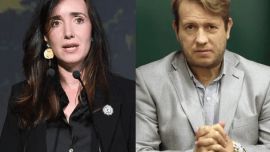This weekend marks one year since Argentine football came screaming to a halt, in the face of a still-mysterious virus that had just prompted the World Health Organisation to decree a global pandemic in process. The measure was accompanied by a general shutdown of all non-essential travel and activities across the country, in a bid to stop the spread of a virus which had first appeared in Argentina at the start of March 2020 but, it was hoped, would not take hold in the devastating fashion seen in China, Italy and elsewhere at the time.
Twelve months down the line Covid-19 remains hugely prevalent nationwide. With more than two million confirmed infections and 50,000 deaths Argentina has been hit hard, although strict quarantine measures arguably helped to avoid the harrowing scenes of overwhelmed hospitals and mass graves witnessed in other South American nations such as Peru, Brazil and Ecuador. Football, meanwhile, was one of the last activities to make a re-appearance, with the Copa Liga Profesional beginning as a stop-gap on October 30, months after most of Argentina's neighbours had restarted their own leagues.
It would be comforting to think that normality, or something approaching it, should now be on the horizon. That after a year confined to television sets supporters will soon be flocking back to the stands, giving the game its passion and colour for which it is most famed globally. On this first anniversary, however, there is little optimism on that front; indeed, given the news elsewhere, a new shutdown might even be possible.
That is the case in two states in Brazil, whose health system has been decimated by a new 'Manaos' strain. In São Paulo, Governor Joao Doria has ordered the local championship be suspended for two weeks in the wake of a fresh outbreak even more widespread and deadly than that of 2020. His counterpart in Minas Gerais, Romeu Zuma, made an identical decision to go in force after this weekend's round of matches, while the state of Goias has also banned professional football for the next fortnight, joining regions which had already decreed a suspension including Paraná, Santa Catarina and Amazonas.
While Argentina as of yet has avoided the catastrophic numbers ravaging Brazil, with flights continuing between the two nations and the official start of autumn coming tomorrow, authorities are already bracing for a new surge of infections. “The second wave is a reality, we have already seen what happened in Europe and what is happening in almost all the region's countries,” Health Minister Carla Vizzotti explained this week. “It is very difficult to avoid it in Argentina.”
The question of what happens with football is clearly of secondary concern in such circumstances, but it bears some thought nonetheless. The top European leagues kept playing throughout the so-called 'second wave' of the northern hemisphere winter, a credit to the brilliantly efficient protocols and testing put in place last year. Even so, myriad travel restrictions from country to country claimed as a victim CONMEBOL's World Cup qualifiers, as it quickly became clear that ferrying stars across the Atlantic and back in such a short space of time would prove an impossible logistical challenge in such a fraught context.
In South America, due to the deficit of resources, such organisation promises to be even more of a daunting task. Brazil's extreme case is detailed above; while Universidad de Chile lost no less than 10 players to Covid prior to Wednesday's Copa Libertadores clash with San Lorenzo, going down in Buenos Aires with a team packed with reserves and untested youngsters.
Local clubs and authorities, then, must use this apparent calm before the storm wisely. To its credit the 2021 Copa Liga Profesional has not lost a single game thus far to the pandemic, while individual cases among teams have thankfully been rare. That is no reason, however, for anyone to rest on their laurels.
A second suspension of the domestic league could prove even more crippling than that first stoppage, with clubs still struggling to repair the financial damage caused by those seven long months without playing. Nobody wants to see a repeat of that; but as we stand in the ominous shadow of the second wave it is up to everyone involved in football, as well as its governing bodies and even the national and provincial governments, to double down on controls and ensure maximum responsibility in order to lessen the effect of what could prove to be another long winter in Argentina.



















Comments